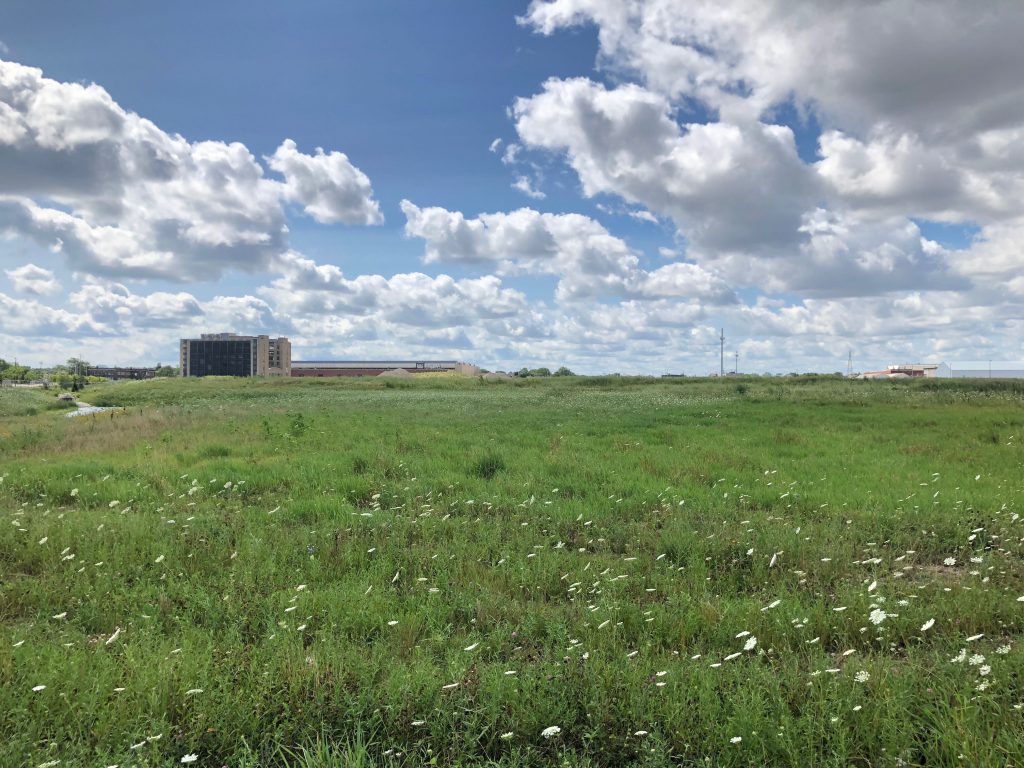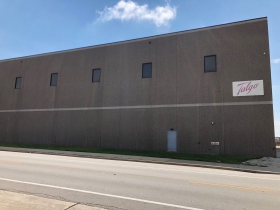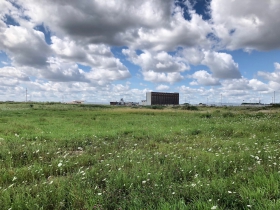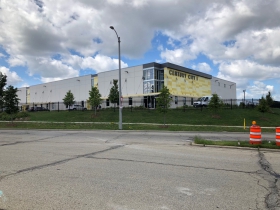What To Do About Century City?
Bailout needed; what's the impact of losing Strauss or trying to start a hemp farm?

A field at the former Tower Automotive factory site in Century City. Photo taken July 26th, 2018 by Jeramey Jannene.
A Common Council committee spent almost an hour Tuesday morning debating its options to address the ailing tax incremental financing (TIF) district used to develop the Century City business park. Everything from a hemp farm to a $13 million nearby home reinvestment program was discussed.
The city needs to eventually repay $24.75 million in debt used to prepare the 84-acre business park near N. 30th St. and W. Capitol Dr., but property values in the district have actually fallen since it was created in 2009, eliminating any incremental revenue that was originally scheduled to pay down the debt.
The district is far larger than the business park itself. It contains over 1,000 properties, approximately 800 of which are residential. Many of the homes are now worth less than they were in 2009, dragging down the combined value of the district.
Limited development has occurred in the business park since it was first available in 2014. A speculative industrial building was acquired by Good City Brewing in 2018, but only after General Capital Group and a city-entity involved in developing the project agreed to take a loss on the deal. Talgo is rebuilding passenger rail equipment in a leased space on the site, and a host of other tenants have used available buildings on a short-term basis.
City officials remain optimistic that more development will come. “Century City, it’s happening. It’s a conversation that everyone is having right now,” said business park project manager Benjamin Timm last week.
Strauss Brands now-abandoned proposal to build a large meat processing facility in the district was a setback from at least a publicity standpoint, but it wouldn’t have directly bailed out the district. It would have been constructed within an overlay TIF district used to subsidize the company’s relocation, eliminating any direct impact on the existing district’s financing. When the proposal was first discussed in September, Casanova was already warning that the city would need overperforming TIF districts to donate to the Century City district.
The city allocated approximately $17 million from the TIF district to support its effort to create the business park, including buying the former Tower Automotive campus, demolishing almost 2 million square feet of buildings, performing environmental abatement and building new utility infrastructure. With interest, that $17 million in debt will grow to $24.75 million over the 27-year maximum legal life of the district.
A plan before the council’s Zoning, Neighborhoods & Development Committee Tuesday would allocate $13.3 million in excess revenue from three downtown TIF districts to pay off a portion of the Century City debt.
Alderman Russell W. Stamper, II asked Casanova and DCD project manager Lori Lutzka if the city could consider other options. “I was thinking along those lines, put the money into the infrastructure, the houses,” said Stamper. He suggested the city could put some or all of the transferred funds towards fixing up the nearby homes. He also suggested the city consider waiting to pay off the debt. “Do we have a due date on the payment?” asked Stamper.
“I would like to reallocate that $13.3 million into the neighborhoods. I would like to develop a housing program,” Stamper. “I say we redevelop the district, with housing and streets, have a massive redevelopment program.”
But Lutzka said the city’s options are limited by state law. The city is allowed to pay off debt on underperforming districts, but cannot donate to create a surplus. It also can’t authorize new expenses without having an expected increment to pay for them. TIF districts can be used to pay for public infrastructure, but it must be within a half-mile of the district’s boundaries.
Joshua Benson, special assistant to the Comptroller, said defaulting on the debt would result in it falling back on the city’s general fund and tax stabilization fund. He said the $24.75 million figure represents the total cost of the debt, but not the amount due today. “It’s kind of like your mortgage,” said Benson, describing how the total cost is known the day the loan is closed. “We’re not behind. We’re making our payments. Right now the payments are being made through the economic development fund.” The fund consists of all of the TIF revenue.
Ald. Jose G. Perez asked a number of clarifying questions on the district, including why the term “donation” is used. “Donation is the word used in state statute, but it is a transfer,” said Casanova. Lutzka said the city has donated $35 million to 11 districts. That includes the district used to fund the Milwaukee Intermodal Station development, which is now proposed to fund the Century City TIF bailout.
“This is pretty uncomfortable about how we decide to do projects,” said Perez. “I think in general people want to know about how we got here.”
Bauman asked if the proposed donation could be described as a transfer of wealth from Downtown to less wealthy areas of the city. “That’s exactly what we’re doing,” said Lutzka. “I think that’s a good thing,” said Bauman.
“Why aren’t you paying off all the debt?” asked Bauman. “We’re not in a position to do so,” said Lutzka. She said state law only allows donations of five years of incremental property tax revenue from donor districts. Future donations are expected, possibly as early as next year, but the district’s property values could also improve and recover a portion of its costs.
The committee unanimously approved the three donations, as well as $1.85 million for improving the streetscaping around Cathedral Square Park and approximately $1 million for downtown street projects. For more on those projects, see our earlier coverage.
Hemp Facility Is A No Go
The committee also received a briefing on a council-requested study on the feasibility of turning a portion of Century City into a hemp growing or processing facility. After being legalized in 2017, the hemp industry has grown quickly. Stores selling cannabidiol (CBD), a hemp product, have sprung up across Milwaukee and the state.
“There’s a lot of activity out there,” said Timm. He said he and intern Jack Johnston studied options for both indoor and outdoor growing facility. Wisconsin was once a leading hemp producer.
“We attended a number of meetings, we went to Madison,” said Timm before ticking off a long list of businesses and officials the duo met with.
But a number of challenges remain, including startup costs, the limited number of jobs that could be created and negative future impacts on paying back the debt.
Millions of dollars worth of environmental abatement work has taken place on the site making the soil safe for future development, but “it’s a different story if you talk about trying to grow plants in that soil,” said Timm.
Timm and Johnston studied converting 30 acres of the site into an outdoor farm, but Timm said it would require 30 inches of tillable soil capable of supporting the root system. That would cost $4.8 to $5.1 million and would need to be replaced in the future because of nutrient depletion. “That’s a hefty price tag to start off with outdoor growing. We essentially eliminated outdoor growing because of the cost.”
A 16,000-square-foot facility is under operation on the city’s west side. “That’s kind of the scale of what we’re seeing right now,” said Timm. He said even at that size the facility would still only employ one to four people. Processing operations have similar job figures according to the report. Century City’s redevelopment plan requires 15 jobs per acre (43,560 square feet).
Area Alderman Khalif Rainey asked Timm if they studied what’s happening in Chicago and other markets. “We did look at Colorado, Oregon and others. Their focus is more on marijuana.”
A hemp processing proposal is moving forward in Reedsburg, a small city located northwest of Madison. The city sold three acres for a processing operation. “The main reason they sold this property was just to get it back on the property tax rolls,” said Johnston. Timm warned that land used for agricultural purposes could receive a property tax reclassification from the state that dramatically lowers its property tax bill.
“Century City is more suited for manufacturing on a larger scale,” said Timm. “If we are looking at producing hemp there are many opportunities in other areas of the city.”
Timm’s logic found support from Bauman. “I don’t know that I want to sell land at Century City for farming. That’s a pretty big admission of defeat,” said the alderman. He suggested Timm explore other city sites, including a portion of a former landfill on E. College Ave. slated to be used for a solar array.
The committee placed the report on file.
If you think stories like this are important, become a member of Urban Milwaukee and help support real, independent journalism. Plus you get some cool added benefits.
Eyes on Milwaukee
-
Church, Cupid Partner On Affordable Housing
 Dec 4th, 2023 by Jeramey Jannene
Dec 4th, 2023 by Jeramey Jannene
-
Downtown Building Sells For Nearly Twice Its Assessed Value
 Nov 12th, 2023 by Jeramey Jannene
Nov 12th, 2023 by Jeramey Jannene
-
Immigration Office Moving To 310W Building
 Oct 25th, 2023 by Jeramey Jannene
Oct 25th, 2023 by Jeramey Jannene
























